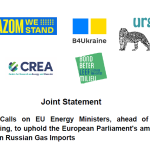| Brussels, 17 June 2024 As European Heads of States and Governments meet today for dinner, top job nominations will be the main course, and deliberations on the next EU Strategic Agenda, dessert. These informal discussions come on the same day European environment and climate ministers convene for more formal debates on the next EU emission reduction target for 2040, resource reduction targets and the ever hanging Nature Restoration Law.
The Strategic Agenda 2024-2029
Based on the 2024 election manifesto, CAN Europe has prepared an input to the Strategic Agenda discussions, which details ideal priorities for the coming 5 years:
- A Strong and Secure Europe
- A Prosperous and Competitive, Fossil-Free, Socially Just and Climate-Neutral Europe
- A Free and Democratic Europe
‘Previous Strategic Agenda leaks were cause for great concerns, with a total lack of clarity and determination to build on the EU’s achievements, especially the European Green Deal’ said Chiara Martinelli, Director at CAN Europe. ‘A rapid transition to a fossil-free, socially just and climate neutral Europe is the only way to secure a competitive industry within a strong, secure, prosperous and democratic Europe. Post-elections, we urge decision makers to opt for a Strategic Agenda which lives up to the environmental, social and economic challenges that concern people and to make the European Green Deal the engine for a green industrial transformative strategy’.
Emission Reduction Targets
Today’s Environment Council will be critical in moving discussions forward on the next EU emission reduction targets, as mandated by the European Climate Law. With the UN climate summit COP29 and the G20 summit fast approaching, the EU is also under observation from global partners to move forward decisively and present its next climate plan under the Paris Agreement by early 2025.
CAN Europe’s priorities for this Environment Council have been communicated to Ministers in advance.
‘We urge ministers to advance discussions towards an ambition of climate neutrality by 2040 and to adopt a courageous 2035 emission reduction target,’ said Sven Harmeling, Head of Climate at CAN Europe. ‘Studies show that this can bring significant socio-economic benefits in the order of a trillion Euros by 2030, if implemented wisely and in an aspiring and socially-just way. An early decision on this would also help to ensure that the EU can submit these new targets under the Paris Agreement by February next year, as promised’.
Nature Restoration
Ministers in today’s Environment Council must now also find a path forward to approve the stuck in limbo Nature Restoration Law. This law is a pivotal opportunity to act against the intertwined climate and biodiversity crises and, consequently, keep the European Union on track to reach the European Green Deal goals. Science has clearly demonstrated that it is not possible to meet EU climate goals without ramping up nature restoration, and there is renewed indication of wide public as well as business support for adopting this law.
Sustainable use of resources
The EU’s material and consumption footprints are still way beyond what is sustainable within planetary boundaries. CAN Europe therefore urges ministers to approve the Conclusions on the 8th Environment Action Plan that call for measures to reduce resource demand at production and consumption levels.
‘We need a binding legal framework for sustainable resource management, with clear resource use reduction targets putting a stop to our patterns of overconsumption’ said Greg Van Elsen, Senior Production & Consumption Coordinator at CAN Europe.
The EU’s material footprint – the total amount of fossil fuels, biomass, metals and minerals it consumes, including embodied in imports – currently stands at an alarming 14.8 tonnes per capita annually. This is more than double the threshold deemed sustainable and just.
—ENDS—
Notes to the editor:
|




